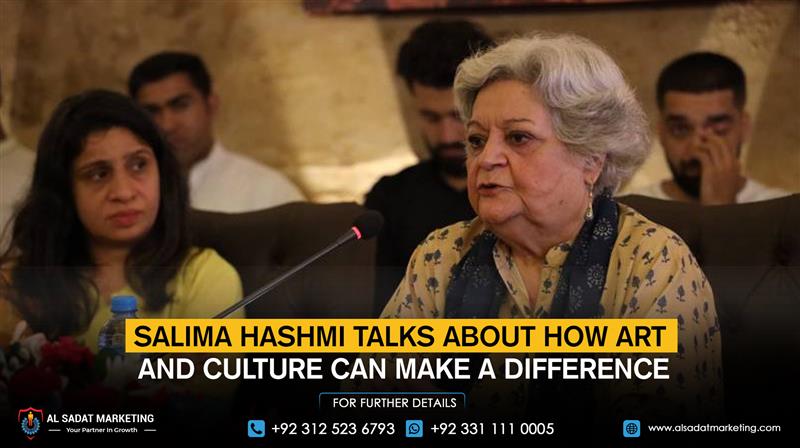Lahore, August 2 — A special session of the Café Learning Series was held at the historic Barood Khan in Lahore Fort this week, featuring celebrated artist, educator, and human rights advocate, Professor Salima Hashmi. The event, hosted by the Aga Khan Cultural Service – Pakistan, brought together a diverse audience of young fine artists, architects, archaeologists, conservation scientists, and craftspeople for a reflection on the power of art, memory, and cultural continuity.
Professor Hashmi, a distinguished figure in Pakistan’s intellectual and artistic circles, delivered an evocative talk tracing her personal and familial journey through the intertwined lanes of history, resistance, and creative expression. Her presentation, enriched by family photographs and deeply personal stories, underscored how culture both shapes and is shaped by society.
Generational Legacy and the Pursuit of Knowledge
Hashmi began by recounting the story of her grandfather, Sultan Muhammad Khan, who rose from humble beginnings in Sialkot to become ‘Mir Munshi’ (chief secretary) to Afghan King Abdur Rahman II. His journey—marked by a passion for learning that began outside a classroom window—eventually took him to the University of Cambridge and later to Queen Victoria’s court as an ambassador.
She then reflected on the life of her father, the renowned poet Faiz Ahmed Faiz. She described how his intellectual upbringing, combined with economic hardship following his father’s death, shaped his political consciousness and poetic voice. His arrest at Lahore Fort during General Ayub’s regime, and the poetry he produced while imprisoned—such as Aaj Bazaar Mein Pā-ba-Jolān Chalo—were offered as testaments to how artistic expression becomes a form of resistance.
Art as Witness and Response
Throughout the session, Professor Hashmi emphasized the artist’s responsibility to respond to societal events. She shared a selection of her own paintings, each rooted in political and social commentary. These works explored themes such as censorship under General Zia-ul-Haq, violence against women, the Kashmir conflict, and the suffering in Palestine.
One piece titled Friday Morning symbolized the quiet resilience of nature, while another series, Homage to Love, paid tribute to dance and joy during an era when artistic expression was heavily suppressed. She dedicated the latter to classical dancer Nahid Siddiqui, who was forced into silence under Zia’s martial law.
Hashmi also recalled a powerful moment from Rawalakot, Azad Kashmir, where a child continued to sit on the rubble of a school destroyed in the 2005 earthquake—an image that inspired one of her most affecting paintings. “That child taught me the meaning of hope,” she said.
A Life Rooted in Purpose
Professor Hashmi spoke passionately about the role of women and the transformative power of education. Expressing hope in the younger generation, she pointed to the increasing number of women in universities, remarking, “That is where the real revolution lies.”
Closing the session, she shared a personal reflection: “I once asked my father, ‘What’s the point of doing all this?’ He said, ‘Nothing ever goes to waste.’” That, she noted, remains the guiding principle of her work.










